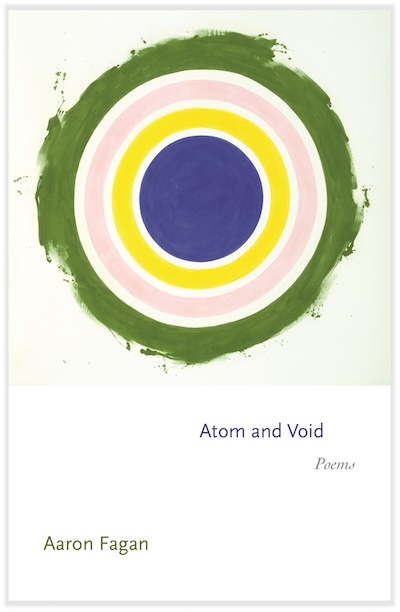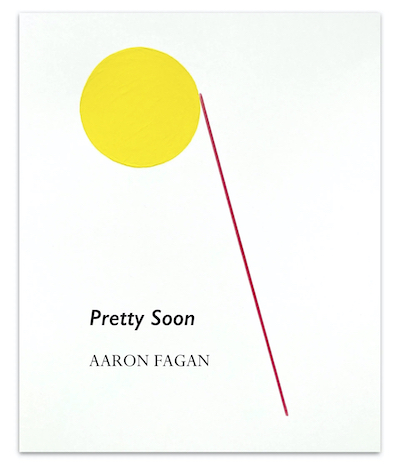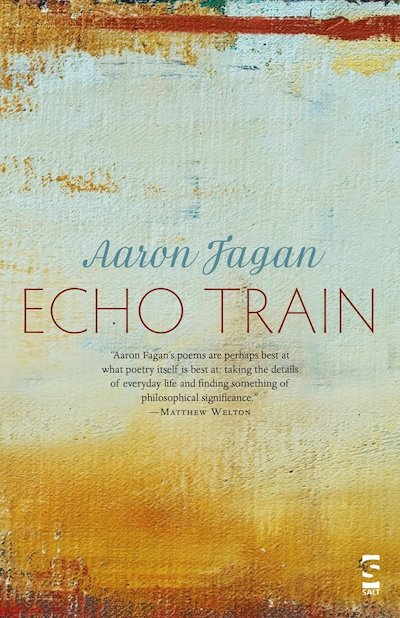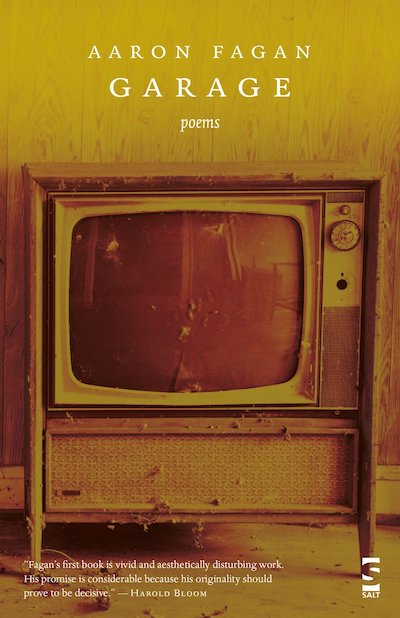
atom and void
(Princeton University Press, 2025)
“Aaron Fagan’s Atom and Void is quizzical and austere, a series of philosophical meditations that strikes sparks with the flint and steel of paradox and tautology. Ezra Pound invented the term logopoeia, ‘the dance of the intellect among words,’ precisely for poems like ‘The Erotic Life of Property,’ which begins with a strange counterfactual, ‘A truck delivers a forest back to itself / As lumber in the field where it once / Stood as trees’ and ends with a lump in the throat: ‘a darkness / In the heart breaks its lost ground.’ Fagan’s irony is as lightly worn as his intellect in these concise but tremendous poems.”
—ange mlinko
“If one version of our genesis starts with Adam and Eve veering into disobedience, a better might begin with Atom and Void—matter and vacuum, presence and absence, being and nothingness—combining in ways that are both arbitrary and ultimately inevitable. Like ‘walls risen from one chaos’ that ‘stand alone against another chaos,’ each of Fagan’s mesmerizing rectangles of language is a monument of exquisite interruption to the silence that lies on either side of it.”
—Timothy Donnelly
“Reading Atom and Void is like skating around a Möbius strip. One face is metaphysical: slippery arguments about what we see and don’t see, elaborate dissections of what we know and can’t or won’t know. The other face flickers with the tactile horrors of a too-real world: an action figure of Goya’s Devoured Son meets Hello Kitty, a louche party ends in vomit, a detailed manual for rendering oneself invisible begins with the acquisition of a severed head. Think Stevens twisted by Escher and infused with Lynch. Fagan has done something timeless, freakish, and wholly terrific here—something like ‘Taking the sky out of a mourning dove / To sing in the voice of the storm it travels / Through with the aura of an emissary.’”
—zoë hitzig
“Page by page, Fagan manipulates the sonnet with a close-up magician’s sleight of hand. Before your eyes, he’ll transform a sonnet into a coked-up shaggy-dog story, a meditation on a drive-in viewing of a Netflix exclusive movie, or even a macabre recipe for invisibility... For Dante Gabriel Rossetti, the sonnet was ‘a moment’s monument’; for Fagan, the sonnet monumentalizes a moment’s accumulating redundancy, its breathtaking obsolescence.”
—christopher spaide, literary hub
“Fagan is by turns wryly self-critical and mutedly humorous at a pitch almost beneath that of human hearing. If many a stanza in Atom and Void seem more parts than whole, those parts frequently have a compensatory power, with an advancing tide anticipating, a page later, ‘Meditations at Sea Level’ or ‘fire saying farewell to fire’ hinting at the burning sword barring the way to Eden (‘I’m writing an essay in my head about Masaccio’s Expulsion’). Lyrically ironic, Fagan’s oeuvre is, by his own admission, intended as ‘a protest aimed / At the librarians of the present and the future’—which makes him sound like a performance artist rather than a mild-mannered formalist.”
—Erick Verran, on the seawall
“Each poem in Atom and Void is a sonnet . . . tasteful and meticulous. . . . Rather than being open and sprawling with implication, each sonnet is finely whittled, resulting in tongue-twisting lines posing the reader with a philosophical problem to decode.”
—Josh Barber, a new measure

Pretty Soon
(Pilot Press, 2023)
“Aaron Fagan’s colloquial voice—by turns mordant, enlightening, despairing, but always witty—not only describes a deeply compelling, interior emotional atmosphere, but a world we’ve made together, and how best to live in it. An astonishing collection.”
—Hilton Als
“Tight, heady, and beautiful: Aaron Fagan’s sonnets obey an invisible procedure that lends his lines a sculptural, haunted equilibrium. Reading these finely wrought poems, I felt like I was being massaged inside a hall of mirrors, and the masseurs, many-handed, were legendary poets of the past. Pretty Soon is wisdom literature, comfort food, night school, Socratic candy, and high-wire elegance.”
—Wayne Koestenbaum
“What most distinguishes Aaron Fagan’s poetry is its range and capacity for surprise, as well as its velocity. From careening, free-form meditations, to homage, to Algren-esque realism, sometimes a blending of all of the above, it makes for invigorating reading. A highly individual American voice.”
—August Kleinzahler
“The sonnets in Pretty Soon dance in beauty like the light: compression, abstraction, impossible ideas lucidly expressed, political and personal truths lucidly slipped out as if in somebody else’s dream, woven through the even-seeming but subliminally jagged surface of the words. Reflections reflect metamorphic awareness, words slide into different words, phrases arouse recollections of other voices. All gathered in, turned to ethical account. Measured and forceful, ‘casual but final,’ these poems stand by their words, and in them.”
—Ian Patterson

A Better Place Is Hard to Find
(The Song Cave, 2020)
“Aaron Fagan’s A Better Place Is Hard to Find contains some of the finest poems I’ve read in years. At once fluid, blistering, and visionary, Fagan’s poems are marvels that I admire for their beauty, their craft, and their fearlessness in the search for truth. What a poet!”
“Witty, inventive, surprising, uplifting, but also drawn to probe the darker recesses of the human psyche, the poems collected here reveal Aaron Fagan at his most compelling. This volume will surely enhance his status as one of the brightest stars in the American poetic firmament.”
—Mark Ford
“Aaron Fagan’s marvelous A Better Place Is Hard to Find revels in ideas without being at all intellectualized. Rather, he takes pleasure in the sheer feel of them as they unfold in long, sinuous sentences, a pleasure the reader shares, even though the poems are not so much addressed to a reader as overheard by one. His poetry feels like it flows on endlessly, ‘Full of what we did or didn’t do, said / Or didn’t say, but it comes and goes, / (Like all things clear) like nothing clear.’”
—John Koethe
“I read A Better Place Is Hard to Find with delight and admiration. I love Fagan’s blunt delicacy and rich plain speech.”
—Lucy Sante
“I’ve been savoring the elegance of A Better Place Is Hard to Find. The poems are rightly mysterious (not mystifying), dignified, suggestive, sinister where they ought to be.”
—Rosanna Warren
—Douglas Crase
—Stephen Yenser
—Kylan Rice, Annulet: A Journal of Poetics
“In his new book, A Better Place Is Hard to Find, Aaron Fagan explores the chasm between what exists, and what we bring into existence. The collection glows red with a sort of divine anxiety, a propulsive panicked search for some world more stable than the one we have made for ourselves. A better place.”
—Ethan Cohen, Gasher Journal

Echo Train
(Salt Publishing, 2010)
“Somewhere along the continuum of black holes and dividing cells, televised moonlight and Sanskrit tattoos, Fagan makes a characteristic music—bluntly oblique, elegantly perforated—out of the sufferings and strange comedy of the everyday grotesque and everyday irrational, ‘inventing / My reason to stay out of thin air.’ This Echo Train reverberates with remnants of everything from souvenir T-shirts to ancient hymns while emerging into the jagged sound of its own present moment.”
—Geoffrey O’Brien
“Aaron Fagan’s poems are perhaps best at what poetry itself is best at: taking the details of everyday life and finding something of philosophical significance. The way he does this—with some brutally beautiful sentences, incredible control of rhythm, and all those perfect final lines—is quirky enough that his writing is original and grounded enough that it always feels true.”
—Matthew Welton
“Like his debut collection, Garage, Aaron Fagan’s Echo Train is a short book of short poems. Its full page of epigraphs—from Carl Jung, Joseph Campbell, and Hayden Carruth—makes it look like a child facing an adult on a see-saw. And yet, like a string-theorist positing extra dimensions, Fagan somehow evens the equation. With lines of roughly equal length, widespread enjambment rarely employed for obvious semantic effects, and a fondness for unexpected turns of phrase and grammar, the typical Fagan poem has a powerful forward flow, trailing whirlpools of complexity.”
—Paul Franz, Foreword Reviews

Garage
(Salt Publishing, 2007)
“Fagan’s first book is vivid and aesthetically disturbing work. His promise is considerable because his originality should prove to be decisive.”
—Harold Bloom
“Way back in the book-writing era, Plato wrote about the ‘old quarrel between philosophy and poetry.’ If the quarrel seemed old to Plato while writing The Republic, to make it seem new in 2007 requires some serious ingenuity. In his inventive first book, Garage, Aaron Fagan seems to be the poet for the job. Like Plato, Fagan is interested in definitions: what kind of philosophizing in a poem is an unearned indulgence, while another sort of philosophizing might qualify as art . . . . As much as Plato attacked poetry, he recognized something vital about a rhetorical stance made lyric; that vitality is sharply present in the questions and turns of thought in Garage. Fagan both considers the ‘laws’ of poetry and breaks them, a mix that has made for an excellent first book.”
—Idra Novey, The Believer
“The intelligent, impeccably crafted poems in Garage, Aaron Fagan’s debut collection, function as philosophical micro-treatises. From the working class angst of ‘Doing My Part for the Tool and Die Industry’ to the post-Romantic musings of ‘Resistentialism,’ Aaron Fagan’s introspections cast light on a world in which the poem’s speakers find themselves trying to make sense of the absurd, and the sense that’s made is the poems themselves, which come to us as bits of gold sieved from the daily dross of human existence.”
—Christopher Kennedy
“Evident [in Garage] is the self-mocking, saturnine temper of such precursors as Alan Dugan (from whom Fagan takes an appropriate epigraph) or even Howard Nemerov. Yet even these anti-lyrics and bedroom palinodes strive towards apt purposes: this poet so given to humble skepticism he still tries to believe that ‘each thing we make/ Results from the wild permutations of love.’”